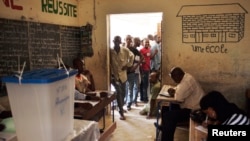BAMAKO, MALI —
Voters in Mali cast ballots Sunday for a new president for the first time after a chaotic 18 months that saw a military coup, an Islamist takeover of the north, and French-led military intervention.
Voting got underway slowly Sunday with polling stations starting to fill up about an hour after they opened. No major issues have been raised, though security remains a key concern in the formerly occupied north.
Short lines of about a dozen people had formed by mid-morning outside polling offices in Bamako's Commune 5.
Voter Toumani Coulibaly said, "The current situation isn't helping anybody. The country can't continue like this, especially with a government that has so little power to work for the people. We need a democratically elected president to get us out of this crisis."
This is only the sixth election Mali has held since independence. Voter turnout has never been more than 40 percent.
High hopes
Some say this election is different.
Voter Amady Diallo said this election is a special case. "We had the war, the coup, the jihadists who invaded the country. We need a legitimate government to fix things. That is why Malians are coming out in mass to vote to get a legitimate president and get Mali out of this rut it is in."
Low voter participation could undermine the authority of this crucial election. Some candidates also expressed concern about fraud in the run-up to the vote, and there are already concerns that results will be contested.
But voters said things appeared to be going smoothly Sunday.
Voter Naba Keita said, "I trust in this election, but authorities need to be vigilant to prevent people from cheating."
Little time to prepare
Mali had just a few short months to prepare for this election. Officials say they did meet their goal of distributing 80 percent of the new biometric voter cards ahead of the vote.
At polling stations in the capital, officials said voting materials were for the most part in place on time, but that some voters were confused about how and where to vote.
Mali's nearly 7 million registered voters are concentrated in the south, but it is in the formerly militant-held towns in the north, however, where authorities fear the most problems.
Security forces are on high alert in Gao, which has been the target of jihadist attacks and suicide bombings since being liberated by French and Malian troops in January.
Forces deployed
French, Malian and U.N. troops are securing the vote nationwide.
Malian forces were able to deploy only to the far northern town of Kidal after June 18 when Mali's interim government struck a makeshift cease-fire deal with MNLA rebels.
Residents of Kidal said voter turnout there was tepid as of mid-day. The region has less than one percent of Mali's registered voters, but its symbolic significance, as the home turf of the separatist Tuareg rebellion, is much greater.
There are 27 candidates on the ballot for this election. If no one wins a clear majority, the two top-scoring candidates will head to a runoff on August 11.
Voting got underway slowly Sunday with polling stations starting to fill up about an hour after they opened. No major issues have been raised, though security remains a key concern in the formerly occupied north.
Short lines of about a dozen people had formed by mid-morning outside polling offices in Bamako's Commune 5.
Voter Toumani Coulibaly said, "The current situation isn't helping anybody. The country can't continue like this, especially with a government that has so little power to work for the people. We need a democratically elected president to get us out of this crisis."
This is only the sixth election Mali has held since independence. Voter turnout has never been more than 40 percent.
High hopes
Some say this election is different.
Voter Amady Diallo said this election is a special case. "We had the war, the coup, the jihadists who invaded the country. We need a legitimate government to fix things. That is why Malians are coming out in mass to vote to get a legitimate president and get Mali out of this rut it is in."
Low voter participation could undermine the authority of this crucial election. Some candidates also expressed concern about fraud in the run-up to the vote, and there are already concerns that results will be contested.
But voters said things appeared to be going smoothly Sunday.
Voter Naba Keita said, "I trust in this election, but authorities need to be vigilant to prevent people from cheating."
Little time to prepare
Mali had just a few short months to prepare for this election. Officials say they did meet their goal of distributing 80 percent of the new biometric voter cards ahead of the vote.
At polling stations in the capital, officials said voting materials were for the most part in place on time, but that some voters were confused about how and where to vote.
Mali's nearly 7 million registered voters are concentrated in the south, but it is in the formerly militant-held towns in the north, however, where authorities fear the most problems.
Security forces are on high alert in Gao, which has been the target of jihadist attacks and suicide bombings since being liberated by French and Malian troops in January.
Forces deployed
French, Malian and U.N. troops are securing the vote nationwide.
Malian forces were able to deploy only to the far northern town of Kidal after June 18 when Mali's interim government struck a makeshift cease-fire deal with MNLA rebels.
Residents of Kidal said voter turnout there was tepid as of mid-day. The region has less than one percent of Mali's registered voters, but its symbolic significance, as the home turf of the separatist Tuareg rebellion, is much greater.
There are 27 candidates on the ballot for this election. If no one wins a clear majority, the two top-scoring candidates will head to a runoff on August 11.




